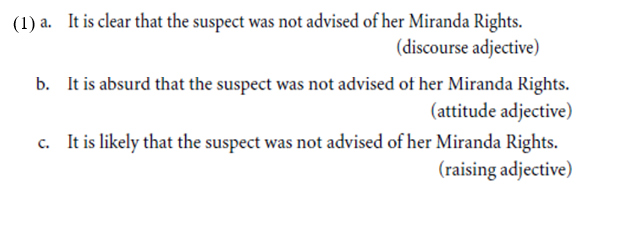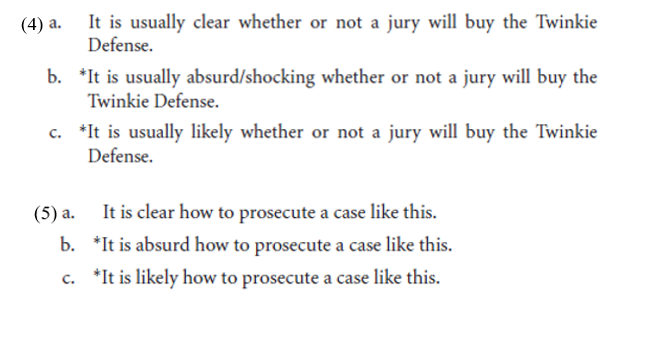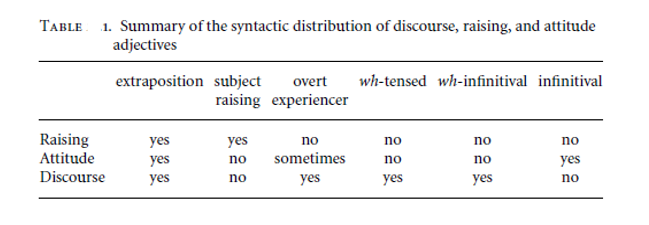


 Grammar
Grammar
 Tenses
Tenses
 Present
Present
 Past
Past
 Future
Future
 Parts Of Speech
Parts Of Speech
 Nouns
Nouns
 Verbs
Verbs
 Adverbs
Adverbs
 Adjectives
Adjectives
 Pronouns
Pronouns
 Pre Position
Pre Position
 Preposition by function
Preposition by function 
 Preposition by construction
Preposition by construction
 Conjunctions
Conjunctions
 Interjections
Interjections
 Grammar Rules
Grammar Rules
 Linguistics
Linguistics
 Semantics
Semantics
 Pragmatics
Pragmatics
 Reading Comprehension
Reading Comprehension
 Teaching Methods
Teaching Methods|
Read More
Date: 2024-01-16
Date: 26-2-2022
Date: 2024-01-03
|
Preliminary observations about discourse adjectives
The data in (1)–(6) show that discourse adjectives have a syntactic distribution that partially overlaps with, yet is distinct from, that of two other classes of proposition-modifying adjectives. These are the familiar class of raising adjectives, such as apt, bound, certain, or likely, and the class of attitude adjectives such as absurd, intriguing, or ridiculous. Raising adjectives are a subset of Kiparsky and Kiparsky’s non-emotive (not suggestive of an emotional response or reaction), non-factive (not presupposing the truth of their complement) predicates. Attitude adjectives are a subset of Kiparsky and Kiparsky’s emotive factive predicates, a label they apply to predicates that express either a speaker’s emotional response to a proposition, or a qualitative opinion.
To begin, the only structure that all three classes appear in is the extraposed structure in (1).

The data in (2) show that raising adjectives is the only one of the three classes to allow so-called subject-to-subject raising.

The data in (3) show that the only class that always licenses an overt experiencer is the class of discourse adjectives. Raising adjectives never do, and attitude adjectives sometimes do.1

Discourse adjectives are also distinguished as the only class that allows wh-complementation. They allow both tensed wh-complements, as in (4), and infinitival wh-complements as in (5).

Attitude adjectives differ from both discourse and raising adjectives in allowing non-wh infinitival complements, as shown in (6).


1 The class of attitude adjectives is admittedly ill-defined in this chapter. Further research is necessary to determine whether and how many subtypes of adjective are captured under this label. What is important for the purposes of this chapter is that there are adjectives in this class that share certain semantic and syntactic properties.
|
|
|
|
حقن الذهب في العين.. تقنية جديدة للحفاظ على البصر ؟!
|
|
|
|
|
|
|
علي بابا تطلق نماذج "Qwen" الجديدة في أحدث اختراق صيني لمجال الذكاء الاصطناعي مفتوح المصدر
|
|
|
|
|
|
|
ضمن برنامج تأهيل المنتسبين الجدد قسم الشؤون الدينية يقدم محاضرات فقهية وعقائدية لنحو 130 منتسبًا
|
|
|